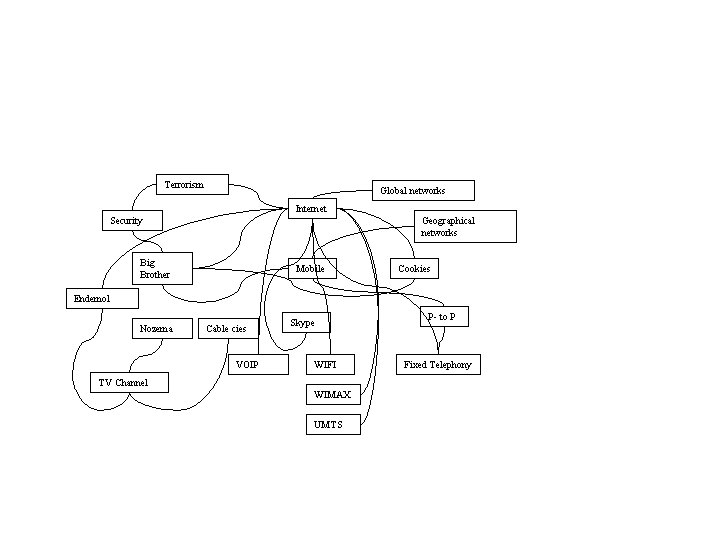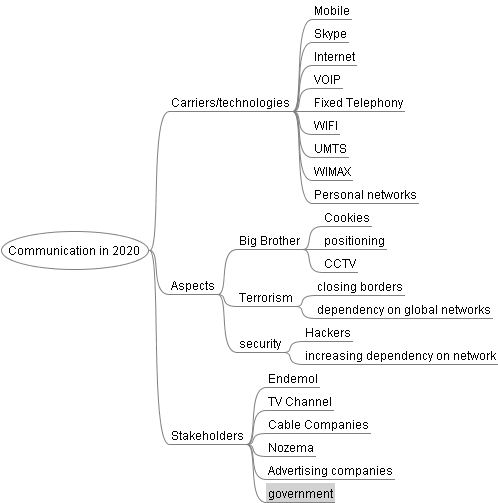Difference between revisions of "The future of communication in 2015"
E.lousberg (talk | contribs) |
E.lousberg (talk | contribs) |
||
| Line 84: | Line 84: | ||
As a result of the first brainstorm the next concept system diagram is made:<br> | As a result of the first brainstorm the next concept system diagram is made:<br> | ||
<br> | <br> | ||
[[Image:Systems_diagram_gr4.png]] | |||
[[Image: | The following "mindmap" is also a help c.q. a start to determine all the aspects related to communication in the future. Please send your comments and/or additions to the creator. | ||
<br> | |||
[[Image:Communication_in_2020.png]] | |||
Revision as of 10:24, 2 October 2005
Introduction
This page will contain the results of the scenario planning process of group 5 of class RSM EMBA05 on the following subject:
The future of communication in 2020
The idea behind this proposed scenario originates from the intensifying battle unfolding in The Netherlands between the incumbent telephony provider, KPN and the cable operator, UPC. Both companies enjoy a monopoly in their core product offerings – that is to say telephony, in the case of KPN and TV/Video, in the case of UPC – and were originally content to restrict their efforts solely to such offerings. Gradually, however, rapid technological advancements enabled both companies to compete across multiple products - TV/Video, the Internet and telephony (fixed and mobile). A recent development was UPC’s attack on KPN’s fixed line telephony business through VoIP (voice over IP). This was the first step in the rapid convergence of all technologies to the IP network. KPN have responded through an attack on UPC’s core product by investing heavily in TV/Video over the Internet (IPTV). How will the battle between the companies now develop?
The key to being able to answer this question is the drawing of a considered conclusion on how the communications industry – and in this we include the entertainment business also - will develop over the medium term – say the next 10 years.
Research questions
1. how convergence of all technologies to the IP network will ultimately affect our lives – as access to the Internet becomes virtually free, will communication/entertainment become a commodity? If so, how will providers differentiate their products? For what will people be prepared to pay extra?
2. how people will choose to lead their lives – i.e. an examination of life style choices - will mobile technology be the driving force? Will people, for example, be watching TV/Video, making phone calls, accessing the Internet and conducting all their banking transactions through their wrist watches?
3. how will technology as the enabler develop? Which is the current and future number of internet provider? Which is the current bottle neck for internet? What is the current driver of internet 2nd generation? Which is the bottle neck of current technology (satellite, cable, radio)?
4. how will people choose to communicate and access entertainment
5. how people will be choosing to interact – whether they will become more or less social Will communication substitute interaction: everyone living in its own space, interacting only via communication)?
6. Will communication allow people to move to live in remote area and still interact with the rest of the world?
7. which will be the impact of security on communication? Will communication be put under control? Be nationalized?
8. With the increase availability of information will the value of communication move from the mean to its features (select information, planning, guide,…)
9. As mentioned, the scenario once finished should amount to a prediction of how we will all be choosing to live in 10 years time.
10. All technology will coverge to the IP network
11. At present wireline access to Internet is the norm
12. Wireless (mobile) access (Wi-Fi/Wi-Max) to the Internet will become more and more commonplace
13. Portable technology (e.g. mobile telephone) will become the most important object in people’s lives from which people will access the Internet, communicate, watch TV/Video, conduct banking transactions, operate security cameras at home etc…
14. Proving access to the Internet will become a commodity service offering
15. Internet service providers will need to differentiate themselves by other means- proving content/services that are irresitible
16. What is the major driver? Technology or demand for convenience?
17. Will working practices change? Will most work be conducted from home/via mobile technology making the need for fixed line technology superfluous?
18. Will people always demand the dual possibility of being able to access services both from home and remotely?
19. If telephony goes via wifi networks and providers like skype, who will pay whom for what?
20. What will be the role of the television channels (will they pay network owners scuh as KPN etc to be broadcasted or will KPN pay them or will customers pay both the network owners and the channels)
21. How do you switch off from the connected world if you are on holiday?
22. In a world where most communication matters will be dealt with on the internet through paid for accounts, how do you continue to manage the raft of passwords and loginnames for different communication services?
23. Using technology like Google’s matching of key search terms to advertising and entertainment selection technology like Tivo will consumers be bombarded with adds.
24. Will the functionality of Vonage (map 10 phone numbers worldwide to one phone) create more international businesses?
25. What is the consequence for ISP’s if governmental organisations make available wireless internet to entire cities for free?
26. What effect will the increase of VOIP have on office life and working from home?
27. How to create a separation between work and personal communication or is there less need for this separation like is the case in China?
=Technology=
- level of convergence of all technologies to the IP network (Jeroen)
- development of new technologies (Graham)
- security (RR)
- creation of unique identifiers and convergence of identifiers/numbers (Giuseppe)
- diffusion of Wireless (mobile) access (Wi-Fi/Wi-Max) to the Internet (Giuseppe)
=Strategy=
- Commoditization of technology and impact of low/no cost wireless connection (Erik)
- Appropriation of value (e.g. voip for skype)(Jeroen)
- Role of television channels: who will own the broadcasting (Graham)
- New role of advertisement (Giuseppe)
=Society=
- Influence of telecommunication on mobility, work habits, lifestyle and on interaction among individuals (Erik)
- Level of access to entertainment (Graham)
- Is technology the driver or is demand the driver (Jeroen)
- Privacy and separation of work from personal life (Rolando)
Research Documentation
Pause or Play? The Future of Interactive Services for TV Accenture white paper
Path to Profitability: How Cable Companies can Achieve Attractive Returns on iTV Servicesanother Accenture white paper
Freeband Communication is a Dutch national research program aiming to create a leading knowledge position for the Netherlands in the area of ambient, intelligent communication. Link to Freeband
Personal Networking Pilot 2008
link to: PNP 2008
Systems diagram
As a result of the first brainstorm the next concept system diagram is made:

The following "mindmap" is also a help c.q. a start to determine all the aspects related to communication in the future. Please send your comments and/or additions to the creator.
